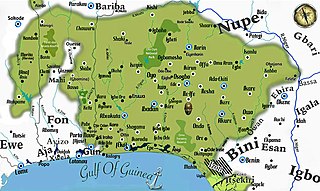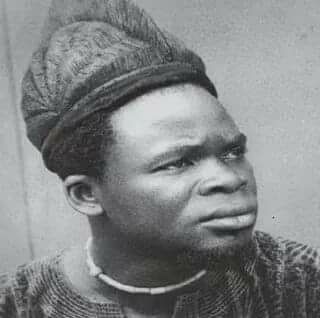
Osogbo is a city in Nigeria. It became the capital city of Osun State in 1991. Osogbo city seats the Headquarters of both Osogbo Local Government Area and Olorunda Local Government Area. It is some 88 kilometers by road northeast of Ibadan. It is also 108 kilometres (67 mi) by road south of Ilorin and 108 kilometres (67 mi) northwest of Akure. Osogbo shares boundaries with Ikirun, Ilesa, Ede, Egbedore, Ogbomosho and Iragbiji and it is easily accessible from any part of the state because of its central nature. It is about 48 km from Ife, 32 km from Ilesa, 46 km from Iwo, 48 km from Ikire and 46 km from Ila-Orangun; the city had a population of about 200,000 people and an approximate land area of 126 km. The postal code of the area is 230.

Yorubaland is the homeland and cultural region of the Yoruba people in West Africa. It spans the modern-day countries of Nigeria, Togo and Benin, and covers a total land area of 142,114 km2 (54,871 sq mi). Of this land area, 106,016 km2 (74.6%) lies within Nigeria, 18.9% in Benin, and the remaining 6.5% is in Togo. Prior to European colonization, a portion of this area was known as Yoruba country. The geo-cultural space contains an estimated 55 million people, the majority of this population being ethnic Yoruba.

Osun State, occasionally known as the State of Osun by the state government, is a state in southwestern Nigeria; bounded to the east by Ekiti and Ondo states for 84 km and for 78 km respectively, to the north by Kwara State for 73 km, to the south by Ogun State for 84 km and to the west by Oyo State, mostly across the River Osun. Named for the River Osun—a vital river which flows through the state—the state was formed from the southeast of Oyo State on 27 August 1991 and has its capital as the city of Osogbo.
The Ìgbómìnà are a subgroup of the Yoruba ethnic group, which originates from the north central and southwest Nigeria. They speak a dialect called Ìgbómìnà or Igbonna, classified among the Central Yoruba of the three major Yoruba dialectical areas. The Ìgbómìnà spread across what is now southern Kwara State and northern Osun State. Peripheral areas of the dialectical region have some similarities to the adjoining Ekiti, Ijesha and Oyo dialects.
Oba-Igbomina, is an ancient Igbomina town in northeastern Isin Local Government Area of Kwara State. It is one of the five related Yoruba towns named "Oba", the others being

Durodola Durosomo Duroorike Timothy Adisa Ladipo, more commonly known as Duro Ladipo, was one of the best known and critically acclaimed Yoruba dramatists who emerged from postcolonial Africa. Writing solely in the Yoruba language, he captivated the symbolic spirit of Yoruba mythologies in his plays, which were later adapted to other media such as photography, television and cinema. His most famous play, Ọba kò so, a dramatization of the traditional Yoruba story of how Ṣango became the Orisha of Thunder, received international acclaim at the first Commonwealth Arts Festival in 1965 and on a Europe an tour, where a Berlin critic, Ulli Beier, compared Ladipọ to Karajan. Ladipo usually acted in his own plays.
Offa is a city in Kwara State of Nigeria, with a population of about 166,112 inhabitants. The town is noted for its weaving and dyeing trade, using vegetable dyes made from locally grown indigo and other plants. Offa is well known for the cultivation of sweet potatoes and maize which also formed part of the favourite staple foods for the indigenes in the town. Cattle, goats and sheep are also raised there. The main religions practiced in the town are Islam, Christianity and traditional religions.

University of Ilorin (UNILORIN), is a federal government-owned public research university in Ilorin, Kwara State, Nigeria. The university's main campus sits on an expansive area of land, about 15,000 hectares in the ancient city of Ilorin; making it the largest university in Nigeria and one of the largest in Africa by landmass. The university comprises 16 faculties and over 100 academic departments offering 103 programmes. It was established by a decree of the Federal Military Government of Nigeria in August, 1975. The University of Ilorin has the highest enrollment of foreign students in Nigeria. The establishment aimed to implement one of the educational directives of the Third National Development Plan, which was aimed at providing more opportunities for Nigerians aspiring to acquire university education and to generate high-level manpower, which is vital for the rapidly expanding economy. Compared to other higher institutions of learning in the country, the institution has one of the largest land areas, covering approximately 15,000 hectares of land. It is reported by Joint Admission Matriculation Board (JAMB) to be the most sought-after Nigerian university in 2021. And again in 2023, it was announced by the JAMB Head, Professor Ishaq Oloyede to be the sought-after University, for the 2023 Unified Tertiary Matriculation Examinations (UTME), making it for the 10th consecutive year.
Ejigbo is a prominent city in Yoruba Land and the headquarters of Ejigbo Local Government Area, one of the oldest local government areas of Osun State in Nigeria. Ejigbo is strategically placed in the middle of the region, as 35 kilometres (22 mi) north-east of Iwo, 30 km (19 mi) from Ogbomoso in the north and 24 km (15 mi) from Ede in the south-east. It is about 40 km (25 mi) north-west of Osogbo, the capital of Osun State, and about 95 km (59 mi) north-east of Ibadan. It is part of the Ede North/Ede South/Egbedore/Ejigbo federal constituency. The population is 138,357 according to the GeoNames geographical database. The average elevation is 426 metres (1,398 ft).
Iree is a Yoruba town in the north-eastern part of Osun State, Nigeria, West Africa.
Esa-Oke is a Yoruba town located at the Obokun Local Government Area of the Ijesa North Federal Constituency of Ife/Ijesa Senatorial District of Osun State, South-West of Nigeria. It is a native Ijesa (Ijesha) community and shares boundaries with other towns namely: Oke-Imesi, Imesi-ile, Ijebu-Ijesa, Esa-Odo, Efon-Alaaye. Omiran Adebolu, a member of the Olofin family of Ile-Ife, though disputably, was believed to have founded Esa-Oke after he left Ile-Ife in 1184 A.D. The traditional title of the ọba (King) is Ọwámiran of Esa Oke.
Ileogbo is the headquarters of Aiyedire Local Government in Osun State, Nigeria. It is situated midway between Ibadan and Osogbo, the capitals of Oyo and Osun State. Ibadan is about 44 km to the south of Ileogbo while Osogbo is about 42 km to its north, Oyo 40 km to its west, while Gbongan and Ife are located to the east of the town.
The Ilorin Emirate is a traditional state based in the city of Ilorin in Kwara State, Nigeria. It is largely populated by the Yoruba-speaking people, though the kingdom is a hybrid state due to the influence of the many other tribes that make up the city.
Ipetumodu () is a city in Osun State, in the southwestern part of Nigeria. It is the headquarters of the Ife North local government. The city is under the leadership of traditional ruler with the title of Apetumodu, which means "one who killed an antelope for sacrificial purposes for Odu".
The Jalumi War, also called the Battle of Inisa, was a battle that took place on 1 November 1878 in the northeast of present-day Osun State, Nigeria. It was part of the larger conflict named the Ibadan War. The forces of Ibadan were victorious in detail over a force of rebellious Yorubas including soldiers from Ilorin, Ekiti, Ila and Ijesha. Despite the victory, fighting continued in the years that followed until the Ilorins were finally defeated in 1897.
Iba is a community in the Ifelodun Local Government Area of Ọṣun State, Nigeria.
The Kiriji War, also known as the Ekiti–Parapo War, was a 16-year-long civil war between the subethnic kingdoms of the Yoruba people, specifically divided between the Western Yoruba, which was mainly the Ibadan and Oyo-speaking Yorubas, and the Eastern Yoruba, who were the Ekiti people, Ijesha, Ijebu people, and others.
Imesi-ile is an ancient town in the northeastern part of the Obokun Local Government in Osun State, Nigeria. In the 19th century, this town was the epicenter of the Jalumi and the Kiriji wars among the Yoruba nations, and the foundation of peace among all warring Yoruba kingdoms, in Nigeria. The town is about one-hour drive from Ilesa; and less than an-hour drive from Osogbo, Osun state capital. It is located on an extremely high hill and almost entirely surrounded by mountains. Because of its unique location and its natural hills and caves within the mountains covering several miles; it was an easy choice for protections during wars in the historic past.
Jeleel Olasunkanmi Ojuade is Nigerian professor of dance studies, first Yoruba Professor of Dance in Nigeria and the Vice-Chancellor of the Crown-Hill University, Ilorin since January 2023. After Ojuade's inauguration in January 2023, Crown-Hill University was renamed as Ojaja University, following the acquisition of the university by the Pro-Chancellor, a Yoruba monarch, Ooni of Ife, Oba Adeyeye Ogunwusi Enitan Ojaja 1 in May, 2023.
The Battle of Òsogbo took place in 1838 and was a major battle of the Fula jihads of Yorubaland.





